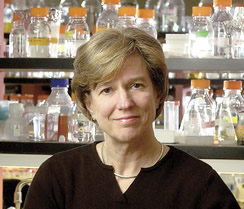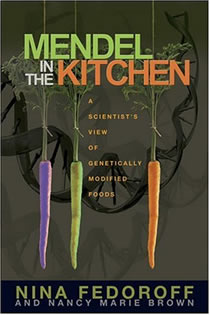Bio
Nina Fedoroff is Evan Pugh Professor of Life Sciences and the
Verne M. Willaman Chair in Life Sciences at Pennsylvania State University, and a leading
geneticist and molecular biologist who has contributed to the development of the techniques used
to study and modify plants today. |
 |
The Topic
| It is interesting to note that the new eleventh edition of the Merriam-Webster Collegiate
Dictionary added the word "Frankenfood" as another term to describe genetically engineered food. This
view is far more prevalent in Europe that in America. In the UK, 6 out of 10 people claim they are
seriously concerned about the safety of such foods. There are many questions that we should consider
asking Dr. Fedoroff, such as: What about these beneficial genes escaping into weeds? Are they harmful
to other animals, like butterflies? Can they cause surprise, maybe deadly, allergic reactions? Will
they drive poor farmers out of business? Do we risk another Irish potato famine, if all crops are the
same GM stock? |
 |
Get the Book
Amazon.com
http://www.amazon.com/exec/obidos/tg/detail/-/0309092051/qid=1100291984/sr=1-1/ref=sr_1_1/103-1847830-9947053?v=glance&s=books
Barnes and Noble
http://search.barnesandnoble.com/booksearch/isbnInquiry.asp?userid=VFp33rWu9WOA&isbn=0309092051&itm=1
Tattered Cover
http://www.tatteredcover.com/NASApp/store/IndexJsp;jsessionid=D053A1878EA171A67ABB2D993A8BA9A1.t2?s=showproduct&isbn=0309092051
